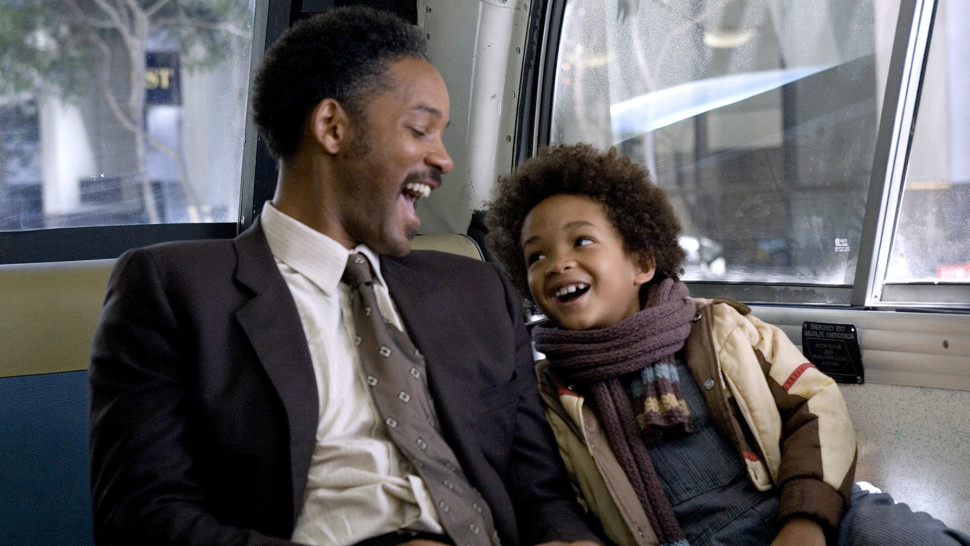How far would you go for your family? This is the question that lies at the heart of the 2006 drama The Pursuit of Happyness. Through its depiction of one man's struggle to protect and provide for his son the film presents a portrait of fatherhood at its most selfless. In its portrayal of its unique story the film pays universal tribute to the self-sacrifice, and love that define fatherhood. This father's day bond with your father over The Pursuit of Happyness.
 |
| Like father, like son |
Based upon the autobiography of stockbroker Chris Gardner, the film relates a tale of one man's journey from poverty to prosperity. The film begins with Gardner struggling to make ends meet meet selling medical scanners that most hospitals deem an unnecessary luxury. Despite his best efforts he, his wife, Linda, and their young son, Christopher, continue to live a 'hand to mouth' existence. Their financial struggles strain the couple's marriage until Linda finally walks out, leaving Chris to raise his son alone. As Chris' finances continue to deteriorate he and Christopher face eviction and finally homelessness. When Chris is offered an internship at prestigious brokerage firm Dean Witter Reynolds he recognizes the unpaid position for the opportunity that it is. Through the ensuing months he is determined to prove himself as both an employee and a father as he struggles to balance his work and family responsibilities, all while navigating life in the shelter system.
The depiction of Chris' journey to Hell and back for the sake of his son makes The Pursuit of Happyness a perennial crowd pleaser and prime Father's Day viewing. The film expertly highlights both the bond that exists between Chris and Christopher and the lengths to which Chris will go to protect this bond. In this way, the film ensures that audiences are just as invested in the pair's relationship as they are in Chris' struggles. The focus upon the bond between the two additionally ensures that even those who have never stepped foot in a homeless shelter will relate to Chris' journey and appreciate just how high the stakes of his pursuit of happiness truly are. Some critics have contended that the film places too high of an emphasis upon Chris' pursuit of wealth, but those critics have missed the point of the film. While Chris' journey does include his struggle to earn an income in order to provide a healthy and stable life for his son, his success is not one that can be measured in dollars and cents. Instead, his success is best measured in terms of the love that motivated him to achieve it and the happiness that it brought to the most important person in his life; his young son. For a film that you and your dad can both enjoy make an investment in The Pursuit of Happyness, but make sure that you invest in a box of Kleenex while you're at it.
Chris Gardner's real life story is brought to vibrant life thank to the stellar work of its cast. Brian Howe exudes likeability at Chris' unlikely ally and boss, Jay Twistle. Thandiwe Newton personifies world weariness as Chris' wife, Linda. Jaden Smith proves himself to be more than just another child actor in a performance that combines a raw emotion, depth, and sincerity that belies his young years as Christopher. Even in the midst of superior supporting performances the film belongs to Will Smith as Chris. In Smith's hands Gardner is more than just one man and is instead an everyman in which all of us can see ourselves. As a result, viewers are certain to be rooting for him on every step of his pursuit of happiness.
At once an apt portrayal of one man's journey and a universal story of the power of family The Pursuit of Happyness is well worth pursuing. Through its unflinching script the film brilliantly brings Gardner's harrowing journey from rags to riches to the screen. The film's real life characters are vividly brought to life thanks to the expert work of its cast. This Father's Day kick back with some grilling and flip your remote onto The Pursuit of Happyness.
 |
| "This part right here...this is called happiness" |




